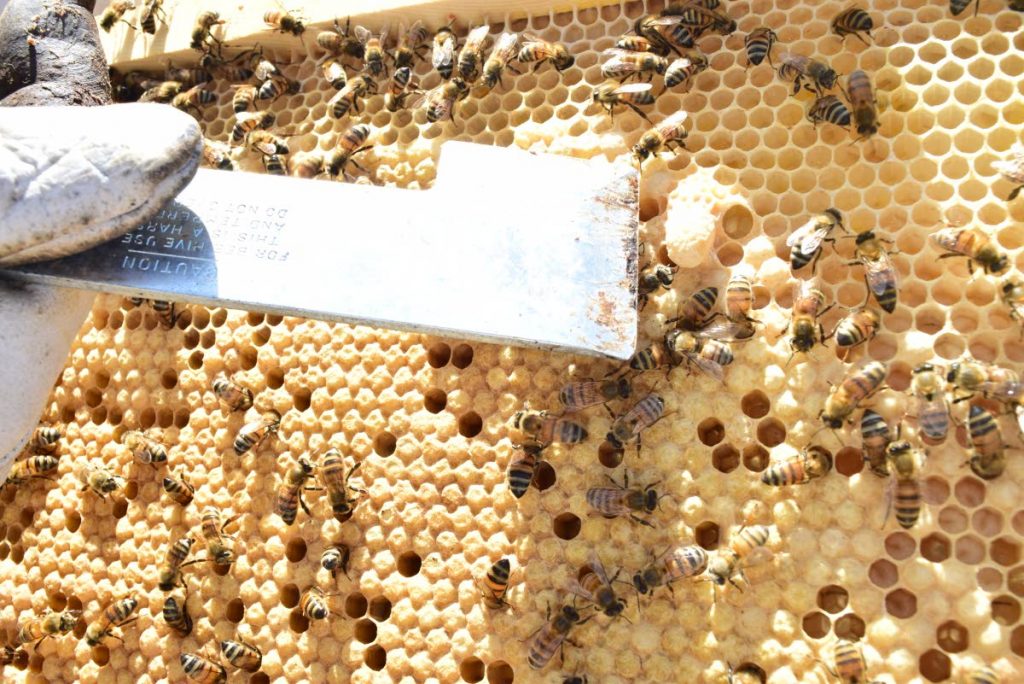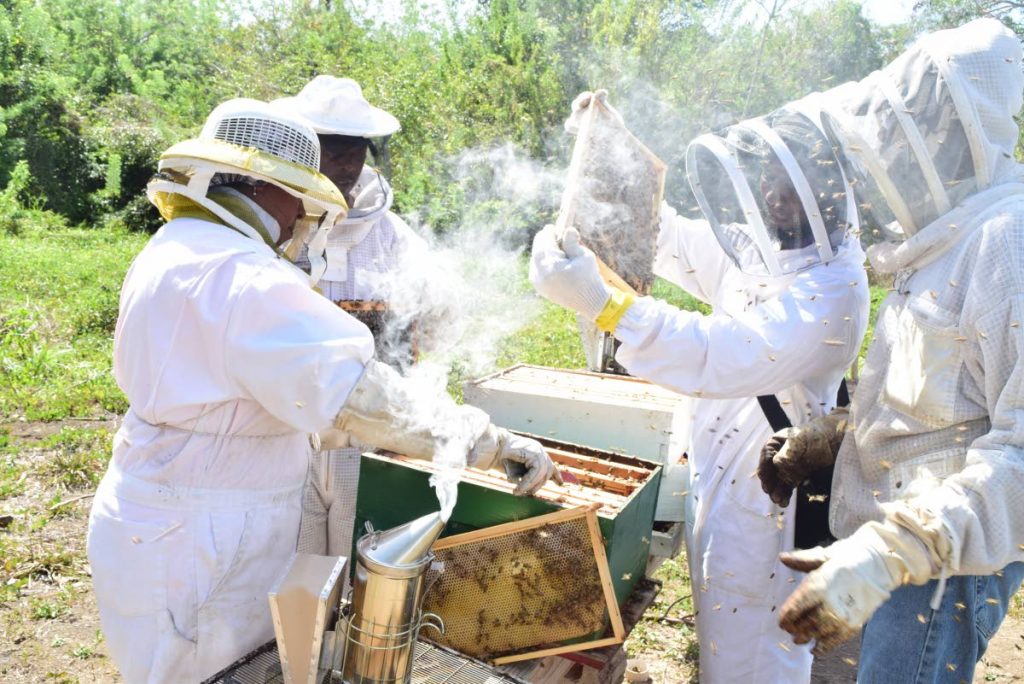Bees good for much more than honey

By Vidya Thurab
Bees. Honey. Stings.
Most people would have enjoyed a taste of honey rather than being at the sorry end of bee stings in their lifetime because most people just get their honey already bottled and ready to be bought at a sales outlet.
Apiarists, however, know about bee stings, and so go well prepared wearing the correct safety gear to see about their beehives.
But more than providing honey, the nectar of the gods, and human, bees are vital to a successful agricultural sector. They pollinate plants and so ensure food crops are available for people to eat.
Mia Persad-Douglas is Vice President of the Tobago Apicultural Society (TAS), a non-governmental organisation formed in 1992 which has as its main focus helping persons interested in beekeeping to get going, and supporting established apiarists.

TAS run an apiary - which houses some 50 colonies used for honey production and as well as starter colonies - at Auchenskeoch, which is managed by Gladstone Solomon, a beekeeper for over 30 years.
In a recent visit to the TAS apiary, Persad-Douglas explained the importance of bees and bee-keeping.
"Our goal is sharing with people the importance of bees in the eco-system, the importance beekeeping as a sector by itself, and it importance to agriculture - bees provide an essential service in terms of pollination.
"Without bees we have a whole range of foods that would not be available to us as humans, including grains and fruits. People tend to think of fruits and flowers when they think of bees, but a lot of grains are also pollinated by bees, wheat and rice and some of these other grains.
“Bees are very important to our economy and our society," she said.

Persad-Douglas noted threats to the bees’ population in Tobago, and that the sector was also under threat internationally.
"…in more developed nations, there have been huge losses of bees because of pesticide use and because we (Trinidad and Tobago) like to follow developed countries in everything. There have been several instances in Trinidad and even in Tobago with beekeepers losing colonies and bees because of adverse spraying practices.
“When you spray for pests and these are not targeted pesticides. they will kill a broad spectrum of insects both the beneficial and non-beneficial,"she said.
“… bees are not so easy to regenerate and in the interim the whole eco-system suffers because pollination is then curtailed for all the crops in the area, not just the particular crop the farmer has sprayed," she added.
She said even fogging for mosquitoes was a threat bees and other insects that help in pollinating food crops.
"It's one of the reasons we are so encouraged by the cessation of spraying/fogging in Tobago in particular because it affects not just our bee population but all our beneficial pollinators like butterflies,” she said.
Persad-Douglas noted losses sustained by beekeepers.
"We had a lot of beekeepers that had losses in the last year because our weather was quite strange. We had a lot of storms come through which would have affected people's colonies and some beekeepers would have had total losses and some would have had heavy losses.
“The apiary, over the past few months, we've been focusing on producing small colonies for people to start up or to restart and expand their operations. So, there are people bringing in what we call nuc boxes (nuc is a small starter hive, starter colony) for people to grow from," she said.
She said issues such as these as well as policy decisions for the agricultural sector – were on TAS’ agenda to talk to its members about and advocate on.
Meanwhile, for persons interested in beekeeping. Persad-Douglas suggested visiting the apiary at Auchenskeoch and get practical experience with handling bees.
“Come to the apiary, learn what it’s all about, see if it’s something that you like because beekeeping is a significant investment, not just in terms of money but it's also an investment in terms of time," she advised.
Persad-Douglas said even though she has years of experience, she still learns a lot at the apiary.
"One of the things I like to do from time to time is to come to the apiary because it's larger than my own, there are normally colonies in a number of different stages, that helps me to recognise things at different stages with my own apiary. They say the best way to learn something is to teach it, so when you help to guide new beekeepers, that helps you as well to hone your own knowledge and to recognise things more quickly and may help to head off problems in your own operation," she said.
Contact the Tobago Apicultural Society through its facebook pagewww.facebook.com/tobagoagriculturalsociety/ or telephone (868) 639-2432.

Comments
"Bees good for much more than honey"